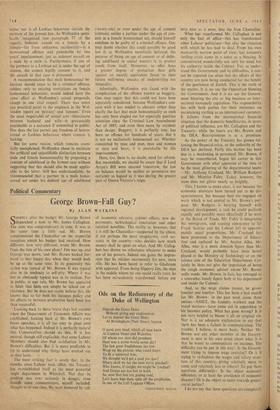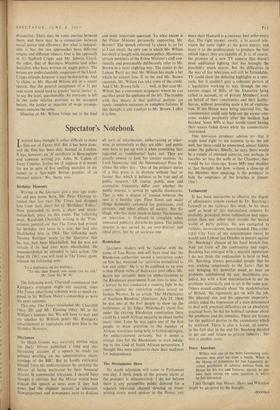Political Commentary
George Brown—Fall Guy'?
By ALAN WATKINS
Smans after the budget Mr. George Brown dispatched a note to Mr. James Callaghan. The note was congratulatory in tone. It was at the same time a little sad. Mr. Brown complimented the Chancellor on the respectful reception which his budget had received. How different, how very different, wrote Mr. Brown, from the fate of his own plans! Jim was up, and George was down, and Mr. Brown looked for- ward to that happy day when they would both he up at the same time. In its generosity this action was typical of Mr. Brown. It was typical also in its tendency to self-pity. Where it was not so obviously typical was in its realism. For in public, at any rate, Mr. Brown has appeared to think that facts can simply be talked out of existence. But he does not really believe this. He knows that so far both his incomes policy and his efforts to increase production have been less than successful.
Looking back to those brave days last autumn when the Department of Economic Affairs was established, looking back at Mr. Brown's own brave speeches, it is all too easy to gloat over what has happened. indeed it is perfectly natural that Conservatives should do this. It is less natural, though still explicable, that some Labour Members should also find satisfaction in Mr. Brown's difficulties. But it is more profitable to try to understand why things have worked out as they have.
The most striking fact is surely that, in the months since Labour took office, the Treasury has re-established itself as the most powerful single department in Whitehall. Not that its position was ever seriously in danger, even though some commentators, myself included, thought so at one time. We were bemused by talk
of economic advisers, cabinet offices, new de- partments, technological innovation and other carnival novelties. The reality is, however, that it is still the Chancellor—supported by the ablest, it' not perhaps the most imaginative, civil ser- vants in the country—who decides how much money shall be spent on what. And Mr. Callag- han has shown no reluctance whatever to make use of his powers. Indeed one gains the impres- sion that he relishes enormously his new, stern role. He has been heard to refer to Gladstone with approval. From being Slippery Jim, the man in the middle whom no one could really trust, he has been miraculously transformed, before our very eyes as it were, into the Iron Chancellor.
What has transformed Mr. Callaghan is not only the fact of office—this has transformed other Labour politicians—but also the situation with which he has had to deal. From his own necessarily narrow point of view, last autumn's sterling crisis came in a sense as a blessing. It concentrated wonderfully not only his mind but his authority inside the Cabinet. For, to under- stand this Government and its difficulties, it can- not be repeated too often that the affairs of this country are now being conducted for the benefit of the gentlemen of Zurich. This is the truth of the matter. It is no use the Opposition blaming the Government. And it is no use the Govern- ment blaming the city or big business or inter- national monopoly capitalism. The responsibility lies with both parties for their insistence on maintaining sterling as an international currency. It follows from the international financial situation that the domestic beneficiaries, in terms of political influence, are Mr. Callaghan and the Treasury; while the losers are Mr. Brown and the DEA. Restrictionism is at a premium.
As the power of the Treasury has grown fol- lowing the financial crisis, so the authority of the DEA has declined. Partly this decline has been due to a weakening in personnel. Mr. Brown, it may be remembered, began his career in this Government with what appeared at the time to be the most glittering of the departmental teams —Mr. Anthony Crosland, Mr. William Rodgers and Mr. Maurice Foley, Today, however, the team does not glitter nearly so brightly.
This, I hasten to make clear, is not because the economic ministers have turned out to be dis- appointments, but because they are engaged on work which is not central to Mr. Brown's pur- pose. Mr. Rodgers is busying himself with regional development, a task he could perform ,equally and possibly more effectiveljt if he were at the Board of Trade. Mr. Foley is integrating the immigrants, and causing annoyance to Sir Prank Soskice and the Labour left in approxi- mately equal proportions. Mr. Crosland has been promoted to the Department of Educa- tion and replaced by Mr. Austen Albu. Mr. Albu, who is a more donnish figure than Mr. Crosland, would probably have been better placed at the Ministry ok Technology or on the science side of the Education Department. Cer- tainly he does not give the impression of being the tough economic adviser whom Mr. Brown sadly needs. Mr. Brown, in fact, has emerged as a somewhat lonely figure both in his department and inside the Cabinet.
And, as the wage claims mount, he grows lonelier and lonelier. This has been a bad month for Mr. Brown : in the past week alone three unions—ASSET, the foundry workers and the wood workers—have come out in opposition to his incomes policy. What has gone wrong? It is not very helpful to blame it all on original sin. Nor is it an adequate explanation to say that there has been a failure in communication. The trouble, I believe, is more basic. Neither Mr. Brown nor any other member of the Govern- ment is sure in his own mind about what it is that he wants to communicate on incomes. The difficulty can be put in this way: Is the Govern- ment trying to impose wage restraint? Or is it trying to re-fashion the wages and salary struc- ture of this country, giving relatively more to some and relatively less to others? To put these questions differently: Is the object economic efficiency, or at least the avoidance of economic disaster? Or is the object to move towards greater social justice?
I do not say that these questions are completely disjunctive. There may be some overlap between them, and there may be a connection between social justice and efficiency. But what is indisput- able is that the two approaches have different origins and different objects. One is the approach of Si: Stafford. Cripps and Mr. Selwyn Lloyd; the other, that of Baroness Wootton and other Socialists who have written on wages policy. The unions are understandably suspicious of the Lloyd- Cripps attitude, however it may be dressed up. And to claim. as Mr. Harold Wilson did in a recent speech, that the general acceptance of a 31 per cent norm would lead to greater 'social justice' is, to say the least, questionable. As everyone is left in the same relative position as he occupied before, the justice or injustice of wage arrange- ments remains the same.
Mention of Mr. Wilson brings me to the final and most important question. To what extent is the Prime Minister personally supporting Mr. Brown? The speech referred to above is, as far as I can recall, the only one in which Mr. Wilson has dealt at length with incomes policy. Moreover, certain members of the Prime Minister's staff con- tinually and presumably deliberately refer to Mr. Brown in a most slighting way. The cynics in the Labour Party say that Mr. Wilson has made a bet which he cannot lose. If in the end Mr. Brown succeeds, Mr. Wilson can take some of the credit. And if Mr. Brown fails . . . well, in that case Mr. Wilson has a convenient scapegoat whom he can sacrifice amid the applause of the left. The trouble with this theory is that political policies are rarely complete successes or complete failures. If this thought is any comfort to Mr. Brown, I offer it to him.



































 Previous page
Previous page